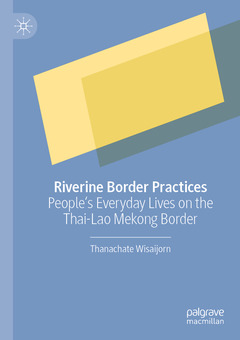Riverine Border Practices, 1st ed. 2022 People's Everyday Lives on the Thai-Lao Mekong Border
Auteur : Wisaijorn Thanachate

Date de parution : 11-2022
Ouvrage de 204 p.
14.8x21 cm
Date de parution : 11-2021
Ouvrage de 204 p.
14.8x21 cm
Thèmes de Riverine Border Practices :
Mots-clés :
Borderland Studies; Mekong Studies; Geography in Indo-China; Everyday Politics; Politics in Southeast Asia; Third Space and the pluralities of border-crossings; Pluralities of border-crossings; Thai-Lao territory; Thai Ban people; Borderland of Khong Chiam-Sanasomboun; Quasi-state Checkpoints; Nation States in Southeast Asia; Temporal negotiation in the Borderland; Third Space and Borderlands; Spatial Negotiation in Thailand; State space and lived space of the Thai Ban; Border conceptualisation in academia



